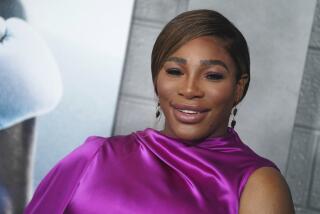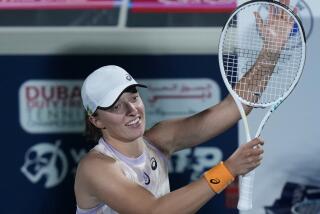Returns a Shared Wish for Williams, Rusedski
Greg speaks.
Serena speaks.
The tennis news was supposed to come far away from Indian Wells on Tuesday -- starting in the early morning hours at Queen’s Club in London featuring Greg Rusedski, and then continuing with a midday conference call with the long-missing Serena Williams.
That might be the first time Williams and Rusedski were mentioned in the same sentence. They both wanted to get out messages for different reasons. The one similar thread is Rusedski and Williams are eager to resume their tennis careers.
As funny as it might sound, his situation is much more straightforward. Rusedski, who was cleared last week of doping charges, might need the ATP’s assistance to secure a protected ranking, and has the hammer of a potential lawsuit to help him in negotiations.
Williams, who has been out of action for more than eight months because of a wounded knee, needs no such tools of persuasion. Her protected ranking probably has been chiseled in stone since the U.S. Open by the WTA Tour, desperately seeking star power.
Her media conference call to announce her planned participation in the upcoming tournament in Miami could have had subtitles, namely: Let’s reassure those nervous Nike executives who made a substantial investment in her and keep them from taking a flying header off the Michael Jordan building in Beaverton, Ore.
She said all the right things, speaking of the “amazing hunger” to return to tennis, that she is “10 times” more excited about it than anyone else,” and finally: “Tennis is my No. 1 priority; it’s my life and I love it.” Minutes earlier, she had offered a contradictory opinion about the place of tennis in her life.
All this was over a scratchy telephone line. You couldn’t see Serena’s expression or whether she was flipping through the latest Entertainment Weekly or Variety, weighing power ratings of the William Morris Agency or Creative Artists Agency.
Her fledgling acting career -- which picked up steam in her long absence following left knee surgery Aug. 1 -- has been the focus of speculation. Had the competition turned into one between tennis and Hollywood? She had several guest shots on network and cable television, and she said Tuesday that she will be appearing on an upcoming episode of “The Division” on Lifetime in April.
Officials from “The Division” said she worked on the show about the second week of February. Williams will be playing a woman named Jennifer Davis who had been missing for 20 years and has been reunited with her family.
Hmm. A woman gone missing for a long, long time. Williams is a fledgling in the acting game and already she’s typecast.
Earlier, Newsweek magazine interviewed Williams for a story in its Feb. 2 issue and observed Serena didn’t appear in any hurry to get back on the court for her day job. She spoke about playing tennis, noting she tried out roles during easy matches and tough ones: “It’s all about the acting.” Could the same be said of Tuesday?
Which is why seeing will be believing. Williams was equally as convincing in November at a fashion show when she said she would come back for the Australian Open. Newsweek spoke of a return the week of Feb. 9. The Doha event in early March came and went because she said she was ill with flu.
Williams said Tuesday she kept fighting with her doctors about returning. If it does happen, Miami might be the ideal venue for her comeback, because of a friendly home crowd and a softer field than in previous years because of the injury-riddled WTA Tour.
Miami is too soon for Rusedski to reemerge. He said Tuesday he is still contemplating possible legal action against the ATP, which runs men’s tennis. Last week, the independent anti-doping tribunal ruled in Rusedski’s favor because it could not rule out the possibility that the ATP may have inadvertently provided the contaminated electrolyte tablets leading to the positive test.
But Mark Miles, the organization’s chief executive officer, was asked about the lessons the ATP has learned from Rusedski’s nandrolone case. The seven other players before Rusedski who tested positive for that banned steroid were also cleared for the same reason.
“The Rusedski case was very specific,” Miles said in a recent telephone interview. “It’s hard to imagine a similar case occurring again.”
But the ATP and its outside experts are no closer to finding the root of the problem. Miles said there has been no commonality, with tests revealing elevated levels from players at small tournaments and significant ones, and spanning the geographic regions and the hierarchy of players.
“We’re still looking for a eureka moment,” he said.
More to Read
Go beyond the scoreboard
Get the latest on L.A.'s teams in the daily Sports Report newsletter.
You may occasionally receive promotional content from the Los Angeles Times.











